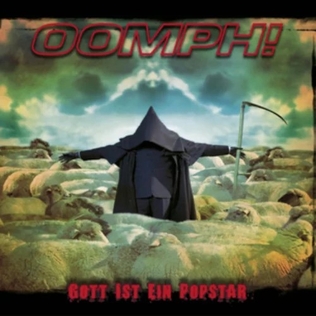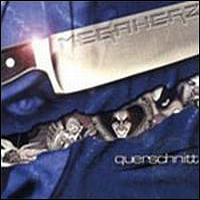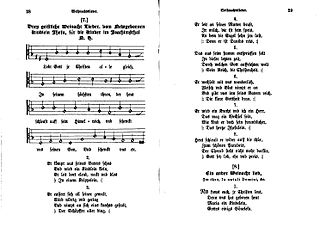
Karel Gott was a Czech singer, considered the most successful male singer in Czechoslovakia and the Czech Republic. He was voted the country's best male singer in the annual Český slavík national music award 42 times, most recently in 2017.

Johannes Mario Simmel, also known as J. M. Simmel, was an Austrian writer.

Alexander "Alexx" Wesselsky is a German singer. He is the lead vocalist of Neue Deutsche Härte band Eisbrecher and previously performed with Megaherz from 1993 to 2003.

Wer bist du? is the first full-length album by German industrial metal band Megaherz, following the limited edition release of their first album, Herzwerk. The album includes three songs from Herzwerk: "Krone der Schöpfung", "Negativ", and "Hänschenklein 1995".

Blemish is a solo album by British singer-songwriter David Sylvian, released in 2003.

"Gott ist ein Popstar" is a song by German rock band Oomph! and the first single from their 2006 album GlaubeLiebeTod.

Querschnitt is a compilation album by German industrial metal band Megaherz. It was released in 2001.

Singet dem Herrn ein neues Lied, BWV 90.2, BWV 190a, is a cantata by Johann Sebastian Bach. The work was written in 1730 in commemoration of the Augsburg Confession.
Gott der Hoffnung erfülle euch, TWV 1:634, BWV 218, is a church cantata by Georg Philipp Telemann formerly credited to Johann Sebastian Bach. It was composed for Whit Sunday in Eisenach in 1717, with text by Erdmann Neumeister. The closing chorale is the first stanza of Martin Luther's hymn for Pentecost "Komm, Gott Schöpfer, Heiliger Geist".

"Nun freut euch, lieben Christen g'mein", or “Dear Christians, One and All, Rejoice” in English, is a Lutheran hymn, written in 1523 by Martin Luther. It is one of Luther's early hymns and considered by some as one of his finest. It was published as one of eight songs in 1524 in the first Lutheran hymnal, the Achtliederbuch. The Achtliederbuch contained four songs by Luther, three by Speratus, and one by Justus Jonas. It appeared also in 1524 in the Erfurt Enchiridion.

"Gott sei gelobet und gebenedeiet" is a Lutheran hymn of 1524 with words written by Martin Luther who used an older first stanza and melody. It is a song of thanks after communion. Luther's version in three stanzas was printed in the Erfurt Enchiridion of 1524 and in Johann Walter's choral hymnal Eyn geystlich Gesangk Buchleyn the same year. Today, the song appears in German hymnals, including both the Protestant Evangelisches Gesangbuch, and in a different version in the Catholic Gotteslob.
Outbreakband is a Christian band from Germany. It was founded in 2007 as a result of Christian youth events at Glaubenszentrums Bad Gandersheim. The band was named after Outbreak, a feature during the Christian youth events of the center.

"Es woll uns Gott genädig sein" is a Lutheran hymn, with words written by Martin Luther based on the Psalm 67. The hymn in three stanzas of nine lines each was first published in Wittenberg in 1524. Its best known hymn tune, Zahn No. 7247, was published in Strasbourg in 1524. Heinrich Schütz and Johann Sebastian Bach wrote settings of the hymn. It was translated to English and has appeared in dozens of hymnals.

"Was mein Gott will, das g'scheh allzeit" is a Lutheran hymn in German. The text from c. 1550 is attributed to Albert, Duke of Prussia. The melody, Zahn No. 7568, goes back to a tune by Claudin de Sermisy, written in 1529 for a secular French song. The hymn has belonged to core Lutheran hymnody without interruption and is part of the Protestant hymnal Evangelisches Gesangbuch as EG 364.

"Ach lieben Christen seid getrost" is a Lutheran hymn in German with lyrics by Johannes Gigas, written in 1561. A penitential hymn, it was the basis for Bach's chorale cantata Ach, lieben Christen, seid getrost, BWV 114.

"Lobt Gott, ihr Christen alle gleich" is a German Christmas carol with lyrics and melody by Nikolaus Herman. It is part of Protestant and Catholic hymnals, has inspired musical settings, and has been translated. The title is also known as "Lobt Gott, ihr Christen allzugleich".
Friedrich Dörr was a German Catholic priest and professor of theology, who is known as a hymnwriter. He shaped the first common German Catholic hymnal, Gotteslob, published in 1975.

"Mit Ernst, o Menschenkinder" is an Advent hymn by Valentin Thilo. It partly paraphrases the call to penitence by John the Baptist. The text was first published in 1642 in the collection Preußische Festlieder. The different melody that later became popular dates back to 1557.
"Lob Gott getrost mit Singen" is a Lutheran hymn in German, a paraphrase of the Latin Te Deum, by the Bohemian Brethren. The hymn is part of the current Protestant hymnal. The hymn was translated into English as "Praise God, praise God with singing". The hymn tune was used for several hymns in different languages, denominations and centuries.
Habakuk is a German pop band from Frankfurt, formed in 1975. The group is focused on new Christian music of the genre Neues Geistliches Lied.














